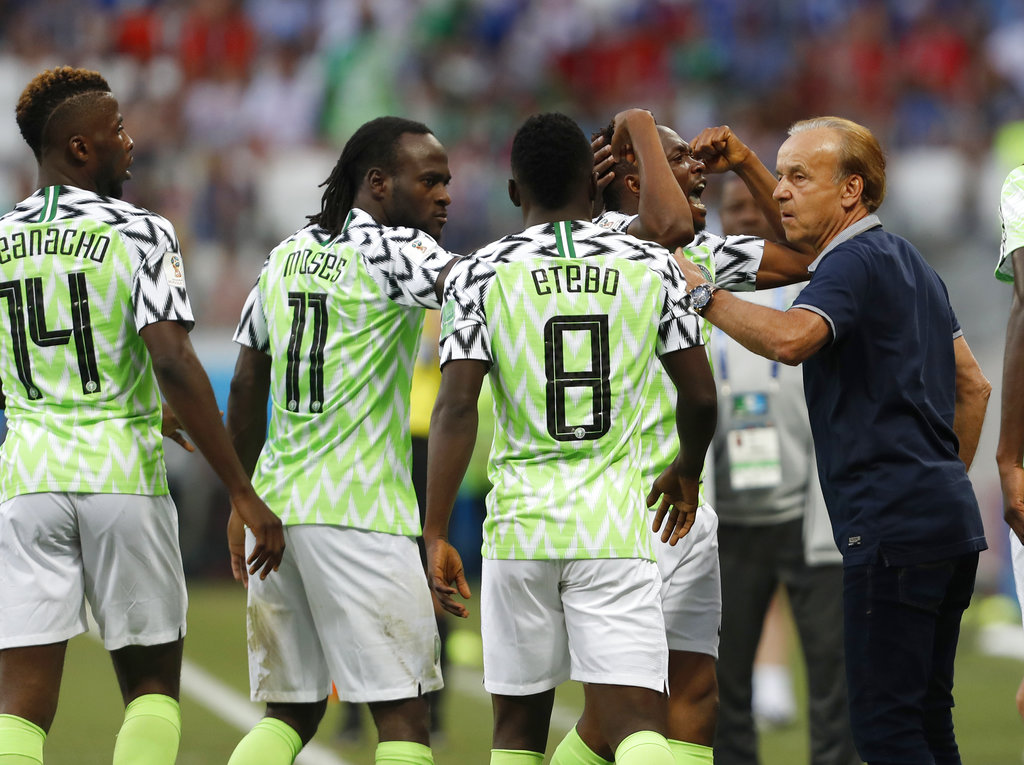
Nigeria head coach Gernot Rohr, right, talks with his players as they celebrate their first goal during the group D match between Nigeria and Iceland at the 2018 soccer World Cup in the Volgograd Arena in Volgograd, Russia, Friday, June 22, 2018. (AP Photo/Darko Vojinovic)
VOLGOGRAD, Russia — Coaches often get the criticism when things go awry on the pitch, and arguably don’t get enough of the credit when things turn out just right.
Ahmed Musa has clearly been the focus of attention for getting Nigeria’s World Cup campaign back on track after his two well-taken goals in a 2-0 victory over Iceland on Friday in Volgograd.
However, the impact of German coach Gernot Rohr should not be under-estimated.
Following Nigeria’s limp 2-0 opening loss to Croatia, the team faced the prospect of being eliminated from the tournament.
Rather than stick with what had got Nigeria to the World Cup at a canter, Rohr opted for change.
As well as bringing in the speedy Musa as one of three changes to the starting lineup, Rohr altered the positions of his two standout players. Captain John Obi Mikel was moved back from a more offensive midfield position to act as a shield in front of the defense, a role he’s accustomed to at his club, Tianjin Teda in China, and formerly at Chelsea. And Victor Moses, who has been part of Nigeria’s attacking unit for years, was brought back to play as a box-to-box wing-back — as he does for Chelsea.
“It was a direct response to the Croatia result. We had to change something and we wanted to push more forward,” Rohr said. “They are playing in their clubs in these positions so they had to accept to play also for the country in these positions.”
Admittedly the changes didn’t seem to give Nigeria an immediate attacking dividend, though the team did look more cohesive as a defensive unit.
So Rohr was ready for another change.
After a fairly insipid first half when Nigeria didn’t register a shot on target, the team came out for the second with renewed purpose after Rohr’s team-talk. Rohr also used the break to substitute defender Bryan Idowu for the more attack-minded Tyronne Ebuehi, a change that almost immediately gave the team more thrust up front.
Within seconds of the restart, Nigeria had its first shot on target and in the 49th minute, the Super Eagles took the lead with one of the goals of the tournament. After a swift counterattack, Musa deftly controlled a Moses cross before slamming the ball past Iceland goalkeeper Hannes Halldorsson on the half-volley. Musa got a second in the 75th after mazing his way into the Iceland penalty area and past Halldorsson, before calmly picking his spot in the Iceland net.
Musa said the coach’s attacking intent with the substitution was clear, and gave the players confidence that “we don’t have to go for last-minute to win the game.”
Iceland coach Heimir Hallgrimsson was certainly impressed.
“All the credit to him,” Hallgrimsson said. “It’s a really exciting future if they keep with the same squad. Nigeria is in good hands with this coach.”
On the eve of the match, the 64-year-old Rohr, who has previously coached Gabon, Niger and Burkino Faso, knew that questions about his future would be asked if Nigeria lost against Iceland. It’s doubtful that his tenure at Nigeria would have lasted much beyond the World Cup, given Nigeria’s high propensity to change managers.
The team, Rohr said, remained defiant in the face of the criticism following the Croatia defeat.
“You have to show that you are a unit when you lose,” he said.
Next up, Argentina.
Coach Jorge Sampaoli is bearing the brunt of Argentina’s poor start to the tournament — a 3-0 loss to Croatia following a 1-1 draw with Iceland.
Nigeria will face Argentina in its last Group D match on Tuesday in St. Petersburg. A win for Nigeria would be enough to advance. But if Argentina claims all three points, Nigeria can still progress depending on the result of the Croatia-Iceland game.
Rohr is hopeful his young charges — Nigeria is the youngest squad at the World Cup — will push on against Lionel Messi’s Argentina.
“We have much to learn and remain modest, but with this spirit you can perhaps hope against Argentina for a surprise,” he said.
Following what’s gone at this World Cup, it’s unlikely many will consider a Nigeria victory over Argentina a massive surprise.

